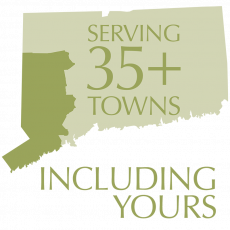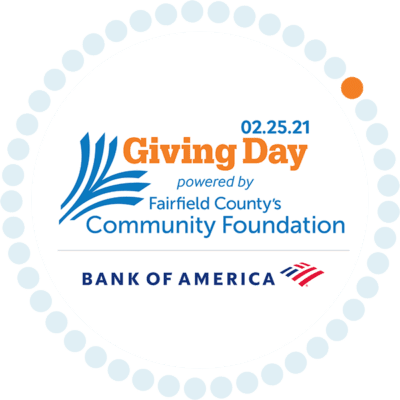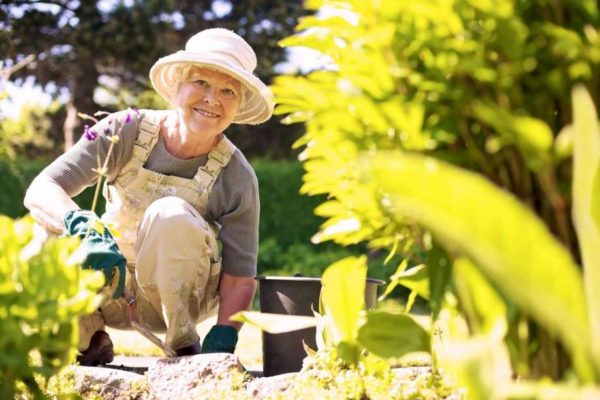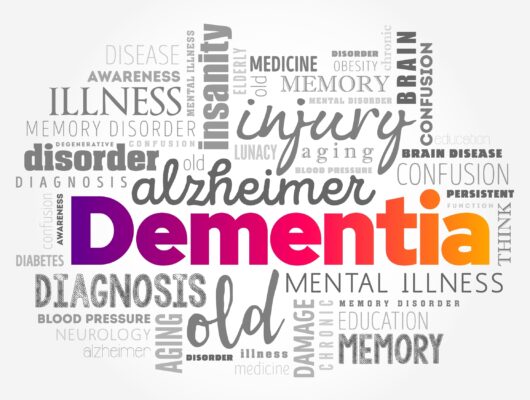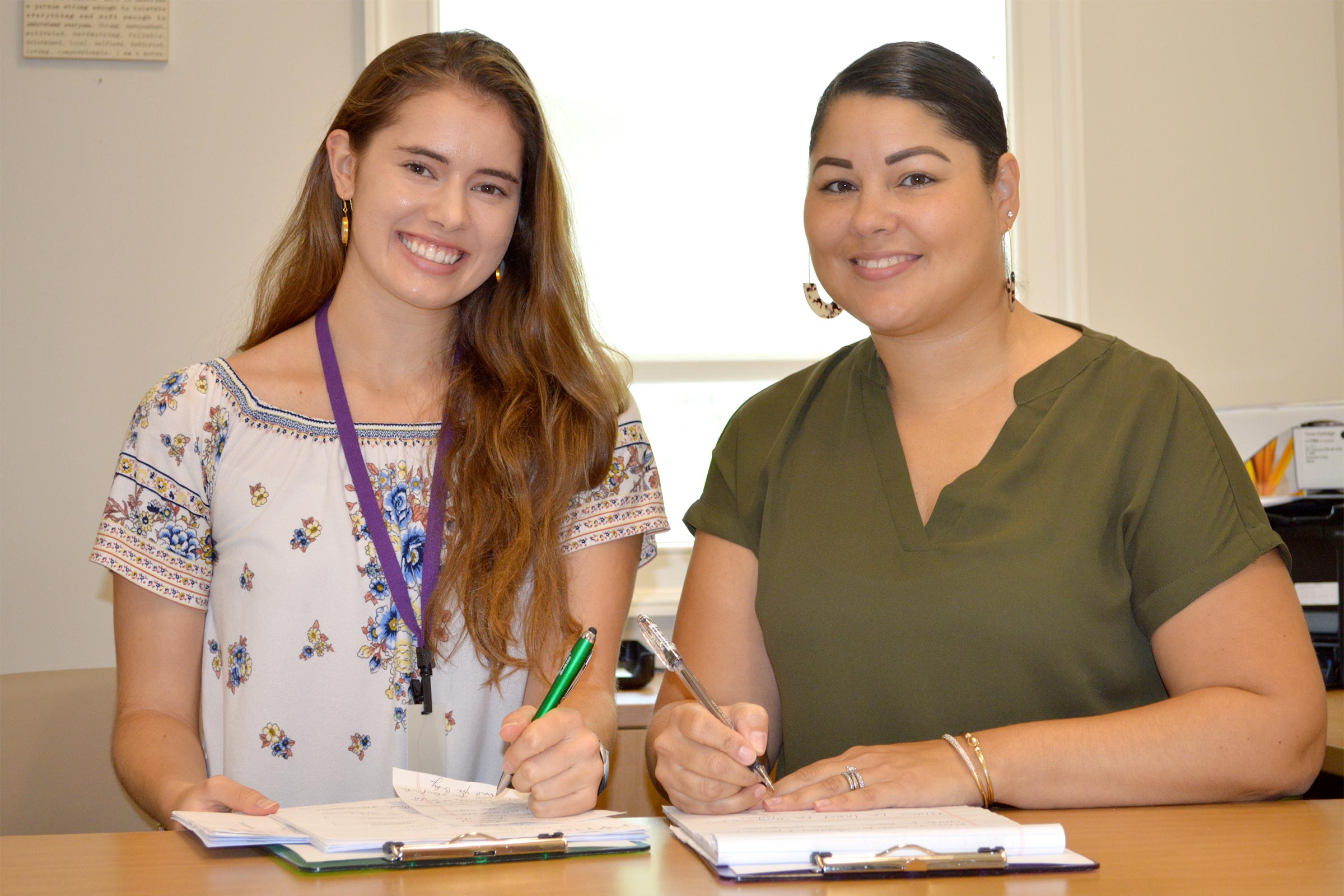

Above: Hospice Volunteer Julia Rothenberger (left) works with Hospice Program Coordinator Jennifer Zucaro
RVNAhealth had the pleasure and good fortune to work with Julia Hergenrother this past summer as a volunteer with our Hospice team. Hergenrother, now a sophomore at Washington University in St. Louis, admits that she didn’t know what to expect when she first inquired about volunteering. But by summer’s end, one of her many takeaways was, “No matter how much time someone has left they have so much life to live before they pass.” Before Hergenrother returned to school in August, she graciously agreed to share her observations on the volunteering experience. Enjoy her insightful story of why and how she came to become a Hospice volunteer, and the impact it’s had on her.
How did you find your way to RVNAhealth? I was looking for unique volunteer opportunities that I would find fulfilling over the summer. Last August, I began my freshman year at Washington University in St. Louis. I was eager to join a couple of clubs, but I was worried that with academics and athletics I would be too busy to join the clubs that sparked my interest. After some consideration, I decided it was best to settle into my first year at WashU, and then plan on joining clubs my sophomore year. I was interested in training to be a part of a sexual assault helpline at WashU.
I was also interested in joining an environmental and sustainability club, another club where students visit an older adult housing facility, and a club called “Night Off,” where students babysit children with disabilities for a night while their parents go out. It was not until I started searching for job opportunities in April that I realized the most fulfilling work, and the way I would learn the most about myself, would be through attending training sessions and volunteering. I figured that if I decided to volunteer for places that had similar missions as the clubs I wanted to join, I would be prepared to join these clubs at the beginning of my sophomore year.
How did you get interested in Hospice? In my senior year of high school I developed a strong interest in TED Talks. I would listen to these talks while driving to school, heading to track meets and during long vacation car rides. Some of the ideas I encountered blew my mind; they were so fascinating to me because in high school most of the ideas we discussed in class were within the guidelines of the core curriculum.
On the other hand, in college I have been exposed to ideas outside the core curriculum. At WashU I took a course called “When I’m 64.” The course’s title was a play on the famous Beatles’ song. This course dismantled the stereotypes of aging and helped the students understand the death-positive movement. This class was so interesting to me because I have always enjoyed dismantling stereotypes and changing the way I view my experiences.
One of the class projects asked groups of students to work with companies in the city of St. Louis to make their building more age-friendly. After finishing this semester-long project, I felt more connected to the older adult community in St. Louis. This is where my interest in helping older adults started.
What do you do when you are not volunteering? Over the summer, I have gotten a chance to work in my mother’s ophthalmology office, and I have also volunteered for four different places within Fairfield County. (I am happy to share that all of these volunteer opportunities have helped me narrow down my interests and all relate to the clubs I was interested in my freshman year). This summer, I wanted my time to be spent wisely. I definitely wanted my time to be focused towards volunteering, but I also acknowledged that after a long school year I needed a break.
Outside volunteering I tend to spend my time reading books (my favorite this summer was “Just Mercy” by Bryan Stevenson) watching movies, going to the beach, biking, photography, doing yoga on the porch with my sister, and most of all, spending time with my family. I am so grateful to have been able to get the chance to volunteer for so many different organizations with beautiful mission statements, but I am also extremely grateful that at the end of the day my family is together sitting at the dinner table.
Has working in the Hospice field been as you expected? To be very honest, I had no idea I could ever volunteer for Hospice. I have always loved humanitarian and social work, especially because I have personally seen the positive change it can have in someone’s life. At WashU I am on the path to studying humanitarian and social work. During this school year, I figured the only way I would be able to get real, first-hand experience of social work would be through an internship through WashU, but the more I researched in April, the more I realized I could get this experience outside my school.
When I initially agreed to volunteer for RVNAhealth Hospice, Cindy Merritt informed me that I would need to go through a 16-hour training program. This got me very excited because I knew I would have a chance to become more exposed to what RVNAhealth had to offer, thus more interested in its mission and more interested in potentially pursuing this field after college.
At first, I figured that I would mostly be doing administrative work behind a desk. Even though I have been doing administrative work, I have also made relationships with all the friendly employees at RVNAhealth. I never imagined the staff would be so welcoming. These men and women are a real inspiration to me, and I am so thankful to get a chance to see the impact they make on a daily basis. On top of this, I never expected I would be able to meet patients through the RVNAhealth. These patients may benefit from my presence in their home, but it is a mutual relationship and I always feel very welcomed and thankful.
Has anything surprised you? I have been surprised by how welcoming everyone at RVNAhealth is. I have also been surprised in the ways in which I have been able to help. After I became a certified RVNAhealth volunteer, my goal was to be more of a help than a burden. I did not want the staff to have to take time out of their day to show me around and give me jobs that they would be able to do in half of the time, but my fears were unfounded. The Hospice employees have a lot of administrative tasks they ask me to complete that are easy to understand and that makes a big difference for them.
Most of all, I have been surprised at how much life there is in the Hospice program. Usually people who agree to Hospice services have around six months to live, but research has shown that these men and women live longer with the help of the Hospice. At first, I was surprised when Cindy Merritt told me this, but now that I have first-hand experience working for the Hospice I understand why this is true. No matter how much time someone has left they have so much life to live before they pass. The months before their death can bring great clarity and love. I am so happy I have a chance to be a part of this.
Will you take your newfound learnings back with you to college? College is a time for self-discovery, and I am starting to envision what profession I want to pursue after graduating from WashU. One of my biggest fears is following expectations, and falling into a profession that I truly do not love. I do not want to end up in a career I dislike just because I did not explore enough as a young adult. This is why it has been so important for me to get a taste of the opportunities available. Next spring, I will need to choose a major, and I am confident that my work this summer has given me more clarity about the areas I would like to study.
I am going to try to encourage my friends to take part in training programs and volunteer opportunities during the school year, internships or via study abroad opportunities. I have found that while volunteering, I learn far more than I would have expected.
Can you tell us a little more about yourself? Any plans, hopes or dreams for the future?! I would like to have an answer to that question, but to be honest I still do not know. At different points in my life I have thought about becoming a motivational speaker, a college track coach, a neonatal doctor, and a therapist. I do not want to limit myself by imagining what I want to be. I want my career to come organically, like my interests. For right now, I am happy with the path I am on, and the work I have put in to get here.
Volunteering at RVNAhealth can take many forms, ranging from administrative help (e.g., data entry, event support) to in-home help (e.g., visiting, pet care). If you’d like to learn more, visit rvnahealth.org/volunteer/ or call 203-438-5555.

